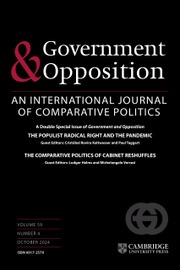
Autocrats and their business allies: the informal politics of defection and co-optation
Sinanoglu, SemuhiExternal Publications (2025)
in: Government and Opposition, first published 26.08.2025
DOI: https://doi.org/10.1017/gov.2025.10021
Open access
Why do business allies (not) defect from authoritarian regimes? An emerging scholarship shows that connected businesses face high political risk, and the autocrat can financially pressure business allies during economic crises. And yet, despite their disruptive power, the business elite rarely switch to opposition. I argue that this unexpected loyalty does not always stem from credible power-sharing. The more material quid pro quo the business elite engage in with the dictator, the less they can credibly threaten the dictator with defection. I present a bargaining game between the dictatorship and its business allies and test it using a country-year-level dataset of 76 countries for 1992–2019. The results indicate that higher degrees of patrimonial co-optation lower the risk of business opposition. This effect is partly mediated through the government’s control over the media landscape. These findings suggest that even informal, non-institutional tools of co-optation can effectively deter defection.
